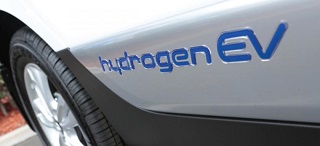How Much Longer Will Toyota Be Pursuing Fuel Cell Vehicles?

While Toyota and a few other global automakers are taking hydrogen fuel cell vehicles quite seriously, the clean technology’s chances of reaching mass adoption are still far away.
Yoshikazu Tanaka, chief engineer of the Toyota Mirai FCV, said that Toyota won’t be giving up on fuel cell vehicles, but electric vehicles are in a stronger position for widespread adoption in the marketplace. “Elon Musk is right – it’s better to charge the electric car directly by plugging in,” he said.
The Japanase automaker has so far only sold about 2,400 of its Mirais in the U.S., and about 4,300 total worldwide. That comes after two years of being on the market, and pales in comparison to EV sales in China, the U.S., and Europe. Toyota’s strategy is based on a diverse product portfolio, with hydrogen-powered commercial trucks being tested in Japan, sales of the Prius Prime plug-in hybrid taking off, and a new business unit dedicated to electric vehicle development. That comes from increasing pressure by governments to provide fossil-fuel free vehicles in the coming decades; and forecasts by several companies including oil giant Shell.
Fuel cell vehicles will be part of it as zero emission vehicles complying with government mandates, but the expectations are strong for mass adoption of EVs by the 2030s. Toyota doesn’t see a fight between the two technologies to be inevitable. “We don’t really see an adversary ‘zero-sum’ relationship between the EV and the hydrogen car. We’re not about to give up on hydrogen electric fuel-cell technology at all,” Tanaka said.
I suppose the first thing to notice about this passage above is the inconsistencies it contains.
• EVs (battery-based and fuel cell) aren’t a zero sum game? There are people who want a zero emission vehicle who aren’t going to want one or the other?
• “It’s better to charge the electric car directly by plugging it in,” but it makes sense to pursue a clearly inferior technological option?
Whatever. In any case, with each passing day, it becomes increasingly clear that this civilization will not be moving in the direction of hydrogen fuel cell vehicles.
When I make a bad investment, and that happens more frequently than I’d like to admit, I like to cut my losses the moment the error of my ways becomes obvious to me. It’s hard to understand why Toyota doesn’t do the same, especially given the acuity with which they see the future in this space.

Craig,
I don’t know how many times I have to explain this to you.
Toyota, Honda, BMW, Hyundai etc are only dabbling in Emission free automotive technology.
Toyota pioneered EV hybrid technology and made hybrids economically viable.
Both EV technology, and HFCV technology are solution to producing zero tail pipe emission vehicles.
Both were born at a time when “peak oil ” was a prime consideration and oil prices were at record heights.
HFCV technology has the advantage being a reliable existing technology that can directly replace the current transport dynamic. However, HFCV requires a massive (although affordable) refueling infrastructure and large scale commitment.
EV’s have the advantage of needing less commitment but come with inherent limitations and technical restriction in ESD storage capacity and refueling problems that have slowed adoption to a snails pace.
Practically, with hybrid and conventional sales increasing, not declining and cheap gasoline, there’s no real incentive to commit heavily to either technology.
Thanks for the “explanation,” i.e., your opinion. To believe this, however, you have to disbelieve the sincerity of people like Carlos Ghosn, CEO of Nissan/Renault and Ben van Beurden, CEO of Royal Dutch Shell, both of whom say that EVs are the most important theme in the future of transportation.
Craig,
Actually, Royal Dutch Shell has spent a great deal of money over the years working out the logistics of both technologies.
While I’m a great fan of Carlos Ghosn, and admire his tremendous dedication and commitment to promoting EV’s, he would be the first to acknowledge ESD capacity and refueling remain the main challenges to EV adoption.
That’s the point, neither technology is ready for mass adoption while a superior, more convenient technology remains available.
You are correct, It’s just my opinion. However, it’s an opinion I’ve been investing in and practicing for more than 20 years long before either Elon Musk or Carlos Ghosn began to get involved.
Look at your own unwillingness to make compromises in your own transport requirements, and maybe you can understand the challenges.
A new solid state ” breakthrough” EV ESD technology may already be on the drawing boards, but until then HFCV’s remain a viable alternative.
I think most people who talk about hydrogen in this space fail to properly regard it as a carrier, and not a fuel.
Though it appears to be the most common element in the universe, hydrogen is produced at ground level by processes that use energy to separate the H from compounds like water or hydrocarbons, and then the H is used as a storage or transport mechanism for that energy to be put to work elswhere. The source of energy used in production matters as well.
As observed, it’s more efficient to charge a battery directly to power a motor than to lose part of the energy by using it in hydrogen production.